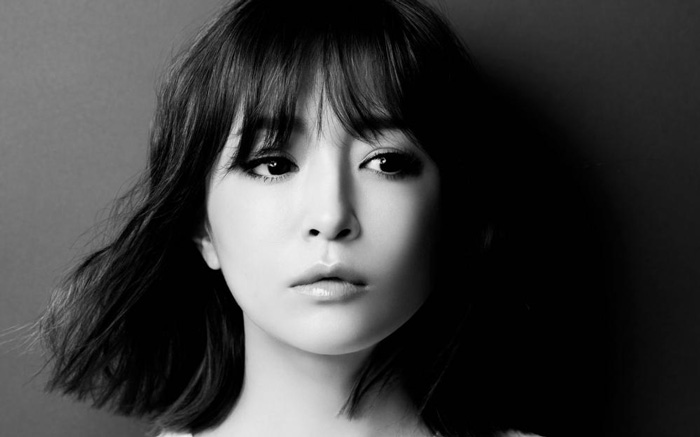
Here is my dedication to listening to Ayumi Hamasaki for almost 15 years. Well, it began with Hamasaki, and then my love for Japanese pop music spiraled in all directions. The first Japanese song I ever heard was back in 2007, with Hamasaki’s Is this LOVE? on YouTube. She was in a furnished apartment singing her heart out, and things were just blowing up everywhere she stood and faced. As a 17-year-old watching this music video in a language I couldn’t comprehend at all at that time, it was the coolest thing ever. It still to me, is one of the coolest MV’s ever released by a female artist. So thank you YouTube; I will forever be grateful to you. Twelve years later, and I still watch Ayumi Hamasaki music videos on YouTube all the time. There is something about them that always draws me in.
Although Hamasaki has changed faces over the years and has a voice like a…I don’t know really how to describe it, her aesthetic presence and musical talent still deserves respect. Being that she is the first Japanese singer I listened to, l just have to pay homage to her and the artistry she has put into her work over the years. And over the years she has turned deaf, has lost her temper on social media, has been criticized for her posts on social media (who isn’t?) has been married and divorced twice, and her overall popularity in regards to music has declined tremendously. Nevertheless, she is still very famous, and I still love listening to her songs religiously. I don’t care what anybody who knows of Japanese pop culture thinks. Whether it’s a sense of nostalgia from my early twenties or just a sense of reward for the sounds that I connect to, I always turn to “Ayu”.
Ayumi Hamasaki has been in the Japanese music and entertainment industry since 1995, not releasing her debut album A Song for ×× until 1999 at the age of 20. Her latest and 17th full-length album, M(a)de in Japan, was released in 2016. While listening to it, I could sense a deep feeling of frustration. Directly towards what I am not sure. But overall, I enjoyed most of the tracks on the album. I found the album very distinguished compared to her other works. Though I do not listen to Hamasaki’s full albums from beginning to end, I truly admire her work here and there. My favorite album of hers from beginning to end is her 3rd album Duty, released in 2000.

The cover shows her duty to the music industry, being a sex symbol, controlled and locked behind bars, despite being the strong feline that she knows she is and will become for her label. She can escape but chooses not to. That is her power. In regard to the meaning of the songs on the album, we all have a duty to perform in this world, to love and to give without conditions, to enjoy the present moment, and to be the best version of ourselves while taking responsibility relating to one another harmoniously regardless of the advantages and disadvantages that occur. All her songs relate to these topics. But Duty conveys this message wholeheartedly both lyrically and musically. The album is mostly pop-rock, but each track has its distinct quality, making the whole album a very impressive one beyond just music in Japanese. Hamasaki released the album during her prime years and she did it very well. To release something that outperforms Duty I think is even difficult for Hamasaki to do today. She set the bars very very high for herself.
One of my most favorite songs to listen to is Heaven, released in 2006 from her album (Miss)Understood. If all hell breaks loose on earth, I will be playing this song on repeat forever. The music video for Heaven, the lyrics and their meaning, and the emotion of Hamasaki’s voice is just so beautiful.
I do agree with other fans that Ayumi needs to go on hiatus to rejuvenate her talent and to take care of herself in general. But then again, she is a superstar and being on stage is the only thing she has ever done. But a woman needs a vacation, and this woman just keeps on working and she needs a vacation. She has lost her hearing in the process, and she’ll be working till the day she loses her voice and can’t sing anymore. When she sings it sounds as if she is straining to release her voice. It’s painful. Aging has caught up to Hamasaki, but through it all, she continues to release “new” content for her fans.
Ayumi Hamasaki herself considers herself a brand and a business—and it’s kind of in trouble, together with the J-pop industry. Even Hamasaki’s latest mini-album, which was released just last year, is called Trouble. I still love J-pop to this day, but I always replay the older tracks from artists that I found about when I first started listening to it. When it comes to J-pop, I only listen to and follow the older artists from the era I grew up with. Any new artist that became relevant after 2010, I rarely follow. They have to be very very out of this world to catch my attention.
I still have a feeling that in spite of her troubles, Hamasaki’s full discography of well over 17 albums and counting will age very well. And because Ayumi Hamasaki is the one that started it all for me, I will forever consider her the true goddess of J-pop. So thank you, Hamasaki. Cheers to you.

Ayumi Hamasaki in her heyday, looking fresh and clean with her second single You, from her major-label debut album A Song for ××, released on January 1, 1999; just at the turn of the new century. Hamasaki writes all the lyrics to her songs.




